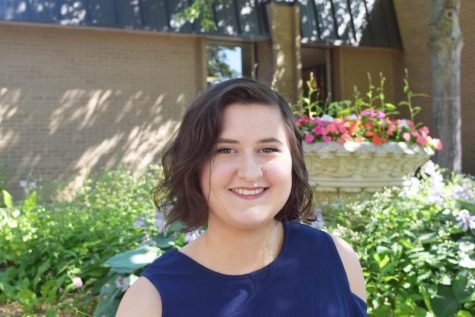Self advocacy option not known by all students preceding Charity Bash assembly
Photo by photo by Meggie Furlong
Nicole Marguerite speaks at the Charity Bash assembly and shares her personal story in vivid detail. Some students who resonated with her experiences found it difficult to listen to the stories shared as it caused intense emotional responses.
This year’s Charity Bash assembly revolved around suicide awareness, and some students who already struggle with mental illness were not as informed of an option to opt out of the assembly if they could not handle the event.
Having an assembly about suicide is important to teach since suicide is the 3rd leading cause of death for teenagers, according to dosomething.org, but the school should have been more aware of the potential for students struggling with mental illness to be part of the audience, or at least not make students feel obligated to attend an assembly that could cause unwanted emotional reactions.
Although counselors and social workers talked with freshman through juniors about what Elyssa’s Mission is in order to prepare them for this sensitive topic, Julie Anderson, social worker, admits there could have been more talk about students advocating for themselves, not having to sit through this assembly, and coming from the counselors and social workers.
“Students always have had the option to advocate for themselves,” Anderson said. “If a student knows they cannot emotionally handle the Charity Bash assembly based on the topic that year, they can talk to their parents, a teacher, a counselor, a social worker or someone who they trust and can help put them in a safe space during the assembly.”
While this may be true, many students did not know they could leave. In fact, the guidance office saw several students following the assembly, which may help to show that the assembly was too much for several students, according to Anderson.
“Personally, I burst into tears at the assembly and I know I wasn’t the only one,” Caitlyn, a freshman who struggles with mental illness, said. “[When] I looked around, I could see a lot of people who were deeply affected by the stories that were being shared. These stories felt very real and the assembly was almost too relatable for me.”
When a topic as sensitive and common amongst teens as suicide is discussed, it is important to at least take into consideration how descriptive the speakers are allowed to get with their stories. The stories shared at the assembly were very inspiring and personal, Caitlyn said, but getting personal with this topic opens up the chance for it to be very relatable and similar to other students and can cause strong emotional reactions with students who are still struggling with mental illness.
The Charity Bash assembly’s purpose is not to cause these types of emotional reactions. They are meant to spread awareness for the topic is, and ideally everyone would go to the assembly and learns something new, Anderson said. She also notes that with a sensitive topic like suicide it is preferred because students really listen and become more aware of what is happening around them; however, no one forced anyone to sit back down if they needed to step away for some parts of it.
The personal and true stories shared by a few students at the assembly were very detailed and referred to their emotions throughout their experiences, and some students could argue that the troubling specifics of their experience were too much, while others say they were necessary.
“A lot of details from the assembly were shared that were really out there, but it was necessary in order to spread awareness,” Caitlyn said. “People shared their personal stories in detail in an attempt to further help others understand what it’s like to live with mental illness or be suicidal.”
The stories needed to be shared with that amount of detail in order to impact the students without mental illness as intensely as they did to insure they were more able to identify and possibly someone who is struggling; if the students did not feel emotional and/or empathetic towards the survivors at all after hearing about their situations then the assembly did not do its job or fully spreading awareness, but there is a difference between feeling empathetic and becoming overwhelmed with emotion.
“Past Charity Bash assembly’s have also caused some students similar intense emotional reactions, but it is understandable why some students might feel the school needed to take students dealing with mental illnesses like depression into consideration,” Anderson said. “[Doing this] might change how much the rest of the student body is affected if the school decided to avoid any specific, potentially triggering details in some of the stories.”
Anderson and Caitlyn agreed that providing a safe space as well as more awareness that there is a safe space for students to go to if an assembly or school event does seem like it would hurt more than help certain students. This way, the school gets the full benefits of hearing those stories and a student that is uncomfortable going could meet the small amount of students in an area near the guidance office so the students can discuss the topic comfortably.

This will be Rachel's third year on staff. After being a staff writer for two years, she has been given the opportunity this year to take on the responsibilities...

